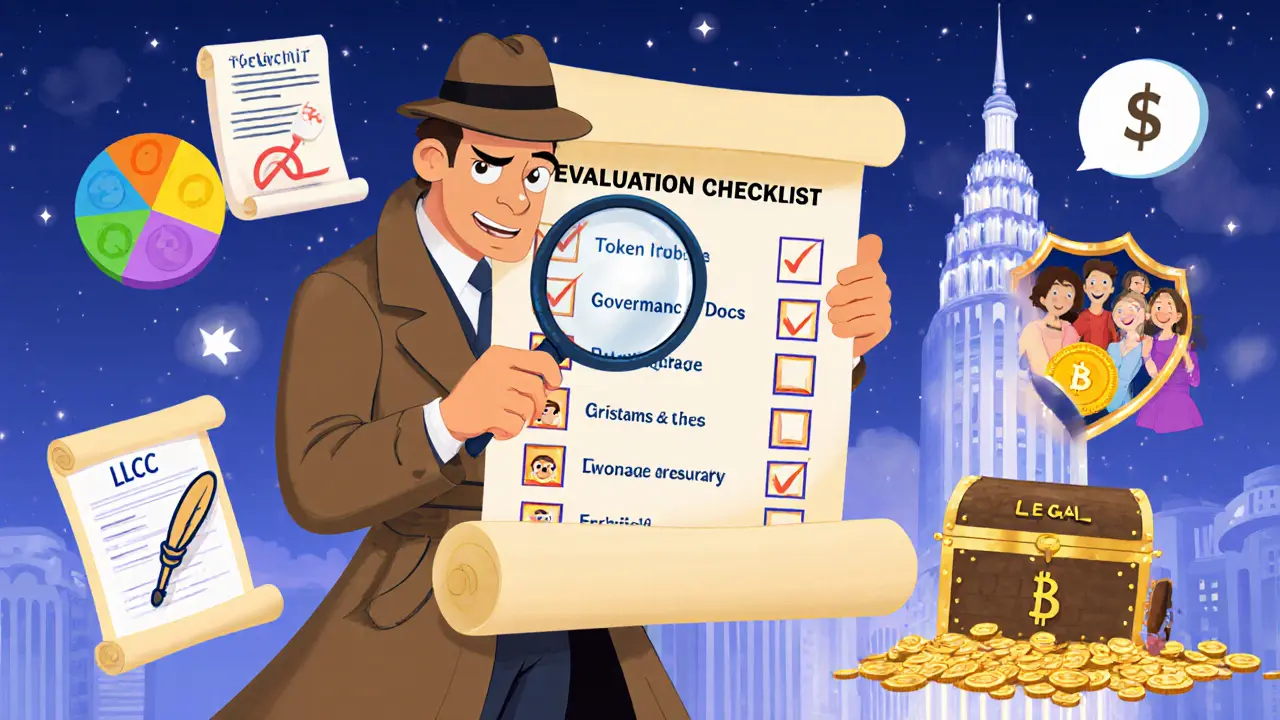DAO Health Assessment Tool
Evaluate Your DAO
Assess a DAO's health based on key success factors from real-world case studies. Complete all fields to receive your score.
DAO Health Score
Token Distribution Score
Governance Documentation Score
Treasury Health Score
Legal Structure Score
Community Engagement Score
Decentralized Autonomous Organizations - or DAO examples - have gone from a hype‑driven experiment to a core building block of the Web3 ecosystem. If you’ve ever wondered which DAOs actually work, why some collapse, and what you can learn before joining one, this guide walks you through the most famous cases, the lessons they teach, and how to evaluate any DAO you encounter.
What Is a DAO?
DAO is a decentralized autonomous organization that runs on blockchain smart contracts, letting token holders vote on proposals without a traditional management hierarchy. In practice, a DAO lives in code, its treasury sits in a crypto wallet, and its rules are encoded in a governance token. Anyone with a compatible wallet can become a member, read proposals, and cast votes - often in a token‑weighted or quadratic manner.
The First Big DAO: The DAO (2016)
The original The DAO was launched on April 30 2016 as a venture‑fund on Ethereum. It raised over $150 million in ETH, but a vulnerability was exploited on June 17 2016, draining a third of its funds. The hack forced the infamous Ethereum hard‑fork and left a cautionary mark: code security and clear upgrade paths are non‑negotiable for any DAO.
Major DAO Categories & Flagship Examples
DAOs now span finance, investment, community, philanthropy, legal services, and real‑world asset ownership. Below we dive into the most visible players in each category.
DeFi Governance DAOs
DeFi DAOs manage protocol upgrades, fee distribution, and incentive programs. Their treasuries can run into billions, yet voter turnout often stays below 5 %.
- Uniswap is a decentralized exchange whose governance token UNI lets holders decide fee structures, token listings, and even multi‑chain expansion. Since 2018, Uniswap has processed more than $1.2 trillion in trading volume.
- Compound lets token‑holders (COMP) govern interest‑rate models and collateral parameters. By September 2023, its total value locked topped $2.7 billion.
Investment DAOs
These pools let members co‑invest in startups, NFTs, or token projects, effectively democratizing venture capital.
- The LAO is an accredited‑investor DAO that has backed over 60 blockchain startups and manages a $32 million treasury (Q2 2023).
- MetaCartel Ventures operates a smaller but highly active fund focused on early‑stage dApps, often investing under $500 k per project.
Social & Community DAOs
Community‑focused DAOs prioritize cultural curation, events, and member perks rather than pure profit.
- Friends With Benefits (FWB) houses roughly 12 000 members, a token (FWB) that gates access to virtual parties, exclusive content, and collaborative art drops.
- Bankless DAO runs an editorial newsletter where token holders curate topics and allocate treasury funds for content creation.
Philanthropy DAOs
Public‑goods funding gets a transparent, traceable twist.
- Giveth has facilitated $47 million in charitable donations since 2017, using a token‑based voting system to prioritize projects.
- Gitcoin Grants employs quadratic funding to match community donations with a matching pool, amplifying impact for open‑source software.
Legal & Real‑World Asset DAOs
Some DAOs attempt to bridge the on‑chain/off‑chain gap.
- LexDAO automates legal agreements via smart contracts, having processed over 200 legal workflows since 2020.
- Krause House DAO raised $4.2 million to purchase a minor‑league basketball team, showing that token‑backed ownership can extend to physical assets.
High‑Profile Failure Cases
Even famous DAOs stumble.
- PleasrDAO attempted a $10 million bid for a Wu‑Tang Clan album in 2022, but internal governance disputes halted the purchase, illustrating how coordination breakdowns can jeopardize large deals.
- ConstitutionDAO raised $47 million in 72 hours for a historic Constitution copy but missed the auction deadline, highlighting operational friction between on‑chain fundraising and off‑chain legal requirements.

Side‑by‑Side Comparison of Leading DAOs
| DAO | Category | Launch Year | Treasury Size (USD) | Governance Token | Main Function |
|---|---|---|---|---|---|
| Uniswap | DeFi | 2018 | $1.1 B | UNI | Exchange fee & protocol upgrades |
| Compound | DeFi | 2019 | $800 M | COMP | Interest rates & collateral limits |
| The LAO | Investment | 2019 | $32 M | LAO | VC‑style startup funding |
| Friends With Benefits | Social | 2020 | $5 M | FWB | Community events & creator support |
| Giveth | Philanthropy | 2017 | $47 M (donations) | GIV | Public‑goods funding |
| LexDAO | Legal | 2020 | $2 M | LEX | Smart‑contract legal services |
| Krause House DAO | Real‑world Asset | 2021 | $4.2 M | KRAUSE | Sports team ownership |
What Makes a DAO Successful?
Across the case studies, three factors keep surfacing:
- Clear governance framework. DAOs with explicit voting thresholds, quorum rules, and dispute‑resolution processes (e.g., MakerDAO’s Chief Risk Officer model) see 2‑3× higher survival rates.
- Robust documentation & support. Aragon’s multilingual docs help 3,800+ DAOs launch with fewer onboarding hiccups.
- Hybrid legal structures. The LAO’s Delaware LLC wrapper and Wyoming’s statutory DAO framework reduce regulatory risk and increase institutional participation.
Conversely, low member engagement, token concentration (top 10 holders controlling >50 % of votes), and ambiguous treasury policies are the leading causes of failure.

How to Evaluate Any DAO Before Joining
- Check the token distribution. Use analytics platforms (Nansen, DeepDAO) to see if voting power is overly centralized.
- Read the governance docs. Look for clear proposal templates, quorum thresholds, and a defined roadmap.
- Assess treasury health. Compare assets under management to the DAO’s mission; inflated treasuries without clear spending plans are red flags.
- Look for off‑chain legal backing. A DAO incorporated as an LLC or registered in a DAO‑friendly jurisdiction tends to have better compliance.
- Test participation. Join the Discord, ask a question, or vote on a low‑stakes proposal to gauge community friendliness.
Future Outlook: Where DAOs Are Headed
Developer activity around DAO tooling grew 27 % quarter‑over‑quarter in 2023, outpacing overall Web3 growth. New standards like EIP‑5805 (DAO‑specific token functions) and Snapshot 3.0’s gas‑less voting aim to lower entry barriers. Hybrid models that pair on‑chain voting with a traditional board (as seen in The LAO’s LLC structure) already enjoy 68 % higher survival odds.
Analysts at a16z predict DAOs will underpin 15 % of global economic activity by 2035, while the World Economic Forum cautions that fragmented regulation may keep most DAOs in niche roles. In practice, expect more enterprise pilots, more legal‑entity hybrids, and a steady rise in sector‑specific DAOs (e.g., climate‑impact DAOs, health‑research DAOs).
Quick Checklist for New DAO Participants
- Set up a compatible wallet (MetaMask, Coinbase Wallet, or Rainbow).
- Secure some of the DAO’s native token for voting power.
- Read the latest governance proposal archive - understand past decisions.
- Verify the DAO’s legal status and jurisdiction.
- Start small: vote on a low‑impact proposal, ask questions in the community chat.
What is the difference between a token‑weighted DAO and a quadratic voting DAO?
Token‑weighted voting lets each token count as one vote, so large holders can dominate decisions. Quadratic voting assigns voting power based on the square root of token amount, which flattens the influence curve and helps prevent plutocracy.
How safe is my money in a DAO treasury?
Safety depends on smart‑contract audits, multi‑sig wallet setups, and the DAO’s governance rules. High‑profile DAOs like Uniswap have undergone multiple audits; however, $1.3 billion was lost to DAO exploits between 2021‑2023, so diversification and due‑diligence are essential.
Can I join a DAO if I don’t hold any tokens yet?
Most DAOs require at least a minimal token balance to submit or vote on proposals. Some community DAOs, like Friends With Benefits, let you earn tokens through participation in Discord events before you can spend voting power.
What legal protections do DAO members have?
Legal protection varies by jurisdiction. Only a handful of U.S. states (Wyoming, Tennessee, Utah) have explicit DAO statutes. Hybrid structures that combine an LLC with a token can give members limited liability, but pure on‑chain DAOs generally lack formal legal recourse.
How do I stay informed about upcoming DAO proposals?
Subscribe to the DAO’s Discord or Telegram, follow its Snapshot or governance forum, and enable email notifications on platforms like Boardroom or DeepDAO. Most DAOs publish a weekly digest of active proposals.

When you’re looking at a new DAO, the first thing to check is how the token is spread out. If a handful of wallets own most of the supply, they can push proposals through without much community input. Use tools like DeepDAO or Nansen to see the top holders and the voting power distribution. A more even spread usually means decisions will represent a broader set of members. Also keep an eye on whether the DAO has a quorum rule that forces a minimum turnout. Without that, you might end up with a “vote” that only a few people actually participated in. Finally, read the governance docs to understand how they handle proposal thresholds and whether there’s a clear process for dispute resolution.
One must commend the author for curating an exhaustive compendium of DAO archetypes; however, the exposition could benefit from a more rigorous analytical framework. The juxtaposition of quantitative treasury metrics alongside qualitative governance structures lacks a cohesive methodological underpinning. Moreover, the discourse would be enriched by a comparative analysis of regulatory environments across jurisdictions, particularly in reference to emerging DAO‑friendly statutes. In sum, while the treatise is comprehensive, it presently teeters on the precipice between informative cataloguing and scholarly rigor.
The ethical implications of delegating financial authority to algorithmic code merit more than a passing mention. When a DAO’s treasury is controlled by token weight, it perpetuates a plutocratic model that can marginalize less affluent participants. Transparency alone does not equate to justice; equitable token distribution and inclusive decision‑making processes are essential to avoid reproducing existing socioeconomic hierarchies. Additionally, the accountability mechanisms for failed proposals should be clearly articulated, lest the DAO become a vehicle for unbridled speculation devoid of moral responsibility.
It is disquieting to observe that several high‑profile DAOs have succumbed to internal discord, as exemplified by PleasrDAO’s stalled acquisition. Such failures often stem from ambiguous governance frameworks and insufficient conflict‑resolution protocols. While the guide highlights these cases, it could further stress the necessity of pre‑emptive checks, such as establishing clear voting thresholds and mechanisms for veto power. The community must also cultivate a culture of constructive dissent rather than permitting unilateral dominance by elite token holders. Without these safeguards, even well‑funded DAOs risk devolving into bureaucratic paralysis.
Wow, another DAO, how original.
If you’re feeling overwhelmed by the sheer number of DAOs out there, start small – maybe join a community DAO just to observe the chat and vote on a low‑stakes proposal. This low‑pressure environment lets you get a feel for the voting mechanics and community tone without risking a lot of capital. Take notes on how decisions are debated and what the quorum looks like, then you can decide whether to increase your involvement.
Delving into the ecosystem of decentralized autonomous organizations reveals a fascinating convergence of technology, economics, and social dynamics that extends far beyond mere token voting. First, the historical evolution from The DAO’s infamous hack to today’s sophisticated multi‑sig treasury architectures underscores the paramount importance of rigorous smart‑contract audits, which have become a standard prerequisite for any serious DAO launch. Second, the diversification of DAO categories-from DeFi governance to philanthropic funding-demonstrates that the underlying governance primitives can be adapted to serve a wide array of collective goals, each with its own risk profile and incentive structure. Third, the emergence of hybrid legal entities, such as LLC wrappers in Wyoming or Delaware, illustrates a pragmatic response to regulatory uncertainty, granting participants limited liability while preserving on‑chain autonomy. Fourth, community engagement metrics, such as voter turnout and proposal churn, have been shown to correlate strongly with long‑term sustainability, suggesting that fostering an inclusive culture is not merely a soft benefit but a hard requirement for survival. Fifth, tooling advancements like Snapshot’s gas‑less voting and Aragon’s modular framework have lowered entry barriers, enabling even modestly sized groups to coordinate complex decisions without prohibitive costs. Sixth, the integration of quadratic voting mechanisms, as employed by Gitcoin Grants, offers a nuanced approach to mitigating token concentration, thereby aligning resource allocation more closely with collective preferences. Seventh, cross‑chain interoperability, now facilitated by protocols such as Axelar, opens the door for DAOs to manage assets spanning multiple blockchains, expanding both the scope and the resilience of their treasuries. Eighth, education initiatives and documentation standards, championed by entities like the DAOstack Academy, are critical for onboarding newcomers and reducing the steep learning curve that has historically hindered broader participation. Ninth, the role of off‑chain governance, through platforms like Discord and Telegram, cannot be overstated, as these channels provide the social glue that binds token holders together and enables rapid coordination during emergencies. Finally, the future trajectory of DAOs is likely to intersect with mainstream enterprises, as corporate venture arms experiment with tokenized incentive schemes, thereby blurring the line between traditional corporate governance and decentralized community stewardship. In sum, the multi‑faceted growth of DAOs signals a paradigm shift that demands both technical diligence and sociocultural awareness from anyone aspiring to engage meaningfully within this emergent paradigm.
Love how the guide breaks down the DAO landscape 🎨 – the tables are super handy and the examples are spot‑on! 🚀 If you’re hunting for a fun community vibe, FWB is a great place to start, and Uniswap still rocks for power users. 🙌 Keep an eye on the governance docs, they’re the secret sauce for staying ahead.
Reading through the case studies makes you appreciate how DAOs are essentially experiments in collective self‑governance. It’s interesting to see how the same token‑weighted mechanisms can produce wildly different outcomes depending on the community’s culture. Sometimes the most successful DAOs are the ones that prioritize open dialogue over raw financial metrics. It reminds me that technology is only a tool; the real engine is human intent.
Don’t just skim the checklist – dig into the proposal archives and test the waters yourself! If the DAO’s governance feels opaque, call them out and demand clearer rules. Aggressive participation is the only way to keep these organizations honest.
Our country needs strong, decentralized structures not weak foreign experiments.
Yo fam! Dive into a DAO today 🚀💥 Trust the process and watch your influence grow 🌱
The guide does a solid job outlining practical steps. It’s wise to verify token distribution before committing funds, as concentration can skew governance outcomes.
Great summary!!! I especially love the checklist – it really helps newbies get started!!!
Ah yes, another “comprehensive” DAO primer – because we absolutely needed another 100‑page read on token voting. Nonetheless, the inclusion of real‑world case studies does add a pinch of practicality to the otherwise theoretical barrage.
While the article paints a rosy picture of DAO growth, it conveniently overlooks the hidden layer of off‑chain influences that manipulate voting outcomes behind the scenes. Beware of the invisible hand.
Take the checklist, apply it, and you’ll navigate the DAO world with confidence. Start small, stay consistent, and you’ll soon see the benefits of collective decision‑making.